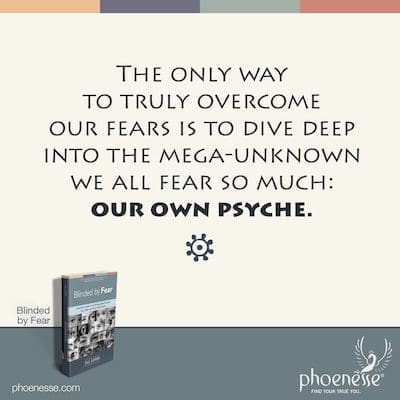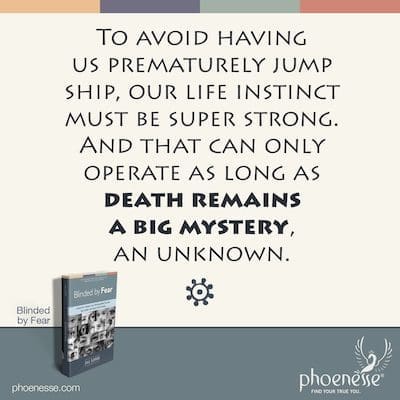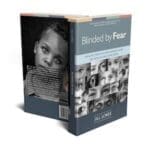Life is a trap, of a kind, stuck as we are in this struggle to overcome the duality between life and death. From this fundamental predicament stem all our other problems, fears and tensions. It shows up in our fear of death, of course, as well as in our fear of aging and our fear of the unknown. What’s the common root of all these fears? The passage of time.
In an effort to deal with these basic fears, humanity has devised various philosophies and spiritual or religious concepts. But even if these concepts are true, evolving perhaps from someone’s attempts to pass on a true experience, they’re not going to do the trick in relieving our tension. Truth be told, the only way to truly overcome our fears—to reconcile the great divide of this giant duality—is to dive deep into the mega-unknown we all fear so much: our own psyche.

Well, how hard could that be? Turns out, it sounds simpler than it is. For to explore the hidden corners of our own minds, we have to do more than resolve dualities. We’re going to need to discover all the facets of our innermost selves, without glibly explaining away any tensions and disturbances we encounter along the way.
Our incentive is this: To the degree we are in the dark about what is going on inside, to that degree we will fear the passing of time; we will fear the great unknown. When we’re young, it’s easy to brush these things aside. But sooner or later, if we won’t face ourselves, we’ll come face-to-face with our fear of death. To the extent, however, that we know ourselves, we will feel fulfilled in life. And to that same degree death will not be feared. Instead, it will occur as an organic development, and the unknown will no longer seem like a threat.
Doing this work of self-discovery is no picnic, friends. Plus, there are escape hatches everywhere. If we look for them, we’ll even find them within the framework of this particular path of growth and healing. The only way then to succeed in unifying ourselves is by ruthlessly searching to see, evaluate and understand ourselves.
There are lots of obstacles to contend with on the road to freedom from fear of death. One of the main hurdles is our fear of letting go of the separating barriers between us and the opposite sex. As long as these hurdles remain in place, our fear of death will exist just as strongly. There is, in fact, a direct connection between three specific fears:
1) Fear of our self and what’s hiding in our own unconscious.
2) Fear of loving a person of the opposite sex.
3) Fear of death.
Perhaps the connection between the first two is beginning to dawn on us, but this third addition to the triad may seem like a novel idea. Let’s explore this some more so we can know the truth being revealed by these words.
Being all we can be
To experience self-fulfillment, we’re going to need to fulfill ourselves as either a man or a woman. Ultimately, to do that, we’ll need to overcome whatever barriers there are between us and the opposite sex. To be sure, this isn’t the only aspect necessary for self-fulfillment. Perhaps we need to become aware of certain talents we possess, or some good quality like courage or resourcefulness. Maybe we need to discover how broadminded we are, or creative.
But none of these can really, truly blossom unless a man becomes a man, and a woman becomes a woman. For whatever self-realization we may accomplish while barriers to union with another are still in place will not be 100% complete. Because what such barriers are pointing to are the barriers within, which are blocking off an area of the self we are avoiding exploring and understanding.
Think of it as a sign we aren’t fully ready to grow up. And instead we insist that some part of us remain stuck in infancy. When all our resistance to seeing these previously unknown parts of ourselves is gone, then we will no longer fear ourselves. And once our fear of self has vanished, we can’t possibly fear anyone else, whether they are the same sex as us or a member of the opposite sex.
Freeing ourselves from unrealistic attitudes will also release our fierce grip of control that prevents us from letting go into a state of being. That same tight grip stands in the way of entering the cosmic stream of timelessness, which is what we experience when we are in the highest states of bliss with a partner. This is also what we experience in the great bliss that we call death.
Death has a lot of faces. For those of us who are afraid, tightly holding onto our little self, we might experience seclusion and separateness as a form of death. By contrast, if we are fully alive and living free of fear, no longer bent on preserving the little self, we can experience death with the same kind of glory as union on this Earth!
So we must tackle this struggle for self-realization from three sides. First, we need to remove the barriers that exist between the conscious and unconscious areas of our psyche. Second, we must remove the barriers that arise between ourselves and our partners, whoever they are at this phase of our journey. Third, we need to look at the barriers that exist between us and the cosmic stream.
When we are being carried by this stream, it will seem that all is right with the world. It’s when we fear ourselves, other people and the stream of life that’s carrying us all forward, that we don’t trust the passing of time. Instead, we hold on for dear life to our little egoic self, creating walls of fog between us and our higher consciousness.
The big triad: Pride, self-will and fear
The clouds that hinder living fully in the current moment are made up of basically three things: pride, self-will and fear. In one way or another, all our faults and confusions, conflicts and misconceptions are derived from these three hindrances. And this same triad blocks the three routes to self-realization we just mentioned. Let’s look at this more closely.
What’s the big barrier between consciousness and the unconscious? Pride. It bars the door because, let’s face it, we’re not going to be thrilled by what we find in there. It won’t be flattering, shall we say. Even if what we find isn’t all that bad, we still fear it might be. After all, we sure were hoping that absolutely everybody was going to admire us, all the time. This is the reason we so often pick up the values of the people whose approval we want. But when we do this, we create a wall of pride, a cloud bank that hinders having insight.
Self-will makes us apprehensive about what we’ll uncover. Because we don’t want to be forced to do something that our little ego doesn’t like. Further, we’re not excited about giving up anything we’re not yet willing to surrender. Our self-will wants our little ego to stay in control, thank you very much, so we can keep clinging to the known.
And lastly, fear pitches in to make us believe that reality is not to be trusted. Better to stick with what I already know. In truth, buried deep in our unconscious is a stream of cosmic reality, of cosmic events. If we enter into this stream, it can’t help but bring us fulfillment, meaningfulness and happiness. But when we don’t trust this stream and therefore hang on tightly to what we know, believing we might fare better than if we take a chance and let go into the unknown, then we build a wall of fear. And this fear is what blocks us from reaching full self-recognition.
This ubiquitous triad of pride, self-will and fear also comes up between ourselves and our partners, creating barriers there. Whether we are a man or a woman, pride pokes its head up because we fear the apparent helplessness—and the shame that comes with it—of giving over to a force that’s greater than our little ego self. Anyone whose been in a relationship knows that loving is humbling business, making it, as such, the enemy of pride.
From the place of pride, we want to call all the shots. We want to direct all the action and control all the outcomes. We don’t want to give ourselves over to any force, even if that force is incredibly desirable. So we all go through life desiring to love, while we’re also busily trying to block it. Our hope is that we can find a compromise for these contradictory currents running through our soul.
No doubt, the force propelling us toward love is a big one. It comes from our deepest, innermost nature. But the antagonists of pride, self-will and fear conspire to push us away from love.
Self-will is also in opposition to love because it wants solo control. It doesn’t want to give itself up, and it won’t let go. It seems to us—wrongly so, of course—that we are only safe when we have only ourselves to obey. To let go and love, then, seems to make no sense. But is this really so?
Being realistic and objective, and being able to relinquish control and fearlessly enter love, are highly compatible forces. In fact, they’re interdependent. But we block the experience of love out of fear we’ll lose our dignity—that our pride will be hurt—and we’ll have to give up our selfhood. In other words, we fear we’ll have to let go of our clamoring little ego self. In reality, we can only gain true dignity and selfhood when we’re willing to give up our pride and our self-will.

The triad on death and dying
Dying is really the ultimate relinquishing of self-direction. So in a strange sort of way, surrendering into death can seem somehow humiliating. As such, when we look at our attitude toward death, we’re likely to once again feel the influence of the triad of pride, self-will and fear.
As a means of avoiding the humbling truth that when it comes to death, the little self doesn’t have total say, we hold tightly to our pride and our self-will, which effectively creates ever stronger waves of fear.
So here we are, faced with a seeming duality between giving up the self and gaining full possession of the self. It looks to be a paradox: Are we only trying to find ourselves so we can give ourselves up in union with another and then to death? The truth is this: We can’t successfully give up something we haven’t found; we can’t freely let go of something we’ve never really possessed.
So then if death and dying are supposed to be so great—such a blissful experience—why do we think of them as being so dark? Why don’t we have a death instinct that’s as strong as the one pulling us to lose ourselves in love? How come we have to work so hard to overcome our fear of death? Why must we battle so hard against this great unknown?
There’s a very good reason for things to be the way they are. For wouldn’t it be easy to wish for death when life becomes hard, painful and unfulfilling? Truly, in the unfinished state we’re in—ignorant and often in a blind state of terror—it sure would be tempting to escape into death. But death, unfortunately, wouldn’t prove any different from life. Both are intrinsically the same.
And so, in order to avoid having us prematurely jump ship, our life instinct must be super strong. And that can only operate as long as death remains a big mystery, an unknown. Mere words can never take away our fear of the unknown. So our life instinct manages to continue to keep our feet on the planet. Rather than caving into destructive motives, we find the stamina to try and try again.
But eventually we will come to master life by coming to understand the self. In this way, we will make peace with the whole universe. And when we reach this point, it will finally also occur to us that death is not something we need to fear. For our fear only exists in direct proportion to our fear of living and loving. Now we can start to see how one could possibly transcend the duality of life and death. The illusion that they are opposites starts to fade.
Finding peace
These words may only make sense once we no longer see life as a threat. Then we won’t be needing to flee life and our life instinct can settle down. Then our life instinct is no longer in opposition to a death instinct. As these merge, we will stop either rushing ahead or holding back.
For if we look closely, we’ll see how we are perpetually fluctuating between two poles. We’re either attempting to hold back time, practically crouching in a fear-cramped position. Or we’re rushing headlong into the future because we just can’t stand the present moment. Rare, indeed, is the day when we are in complete harmony with the cosmic stream of our lives and ourselves.
That’s what it means to be at peace within ourselves, to be in harmony with God. We’re not holding back, we’re not pushing forward, but are dissolving into the stream of life. We are in full possession of ourselves but have no fear about giving up self-possession. This great combination is what we can experience when we are blessed to have found our mate. And we’ll eventually, ultimately, have the privilege of experiencing such peace as we transition into another form of consciousness.
What’s the key that turns the ignition and heads us in this direction? It all lies in the self-discovery that awaits us on many levels deep in our being. Too often what we do instead is project our inner ills onto others and the outside world, hoping to avoid what seems like a terrifying self-confrontation. While doing this appears to give us a certain temporary satisfaction, it leaves us with an empty bucket in the end.
If, instead, we’ll keep chipping away at self-knowing, one little step at a time, we will one day dissolve the clouds and barriers that obstruct our view. The more we tap into the timeless stream of our higher consciousness, the more it will furnish us with the wisdom, rightness and truth that can help us navigate our way every day. Chances are, we’ll tap into it and then lose it again. Perseverance will be required. But our contact with the life stream will inform us about the greater significance of all creation.
We can liken the truth to the sun, which all the other planets revolve around. There in the center, the truth burns brightly, even when it’s covered over by clouds. The clouds, as we said, are made up of our pride, self-will and fear, plus our ignorance that has us pushing ahead of time or fighting against it. But in that precious moment when we perceive our truth, regardless how insignificant it may seem in the grand scheme of things, the clouds float away. We’ll be touched by the warmth that radiates from the truth of our higher consciousness. We’ll have renewed strength and sense of well-being. And we’ll be filled with joyfulness and peace.
We can’t wish away our fears, nor our pride and self-will, hoping this inner sun will shine regardless of what we do. It doesn’t work that way. The truth is constantly ready to warm us and enliven us, but first, we’ve probably got some overcoming to do. Lip service will not take us very far. We don’t have to be perfect. Actually, we are already perfect in a sense, whenever we’re willing to come to terms with our current imperfections.
It’s when we stop struggling against the self, thereby shedding the heavy burden of pride and pretense, that we become willing to change. It’s then, when we also shed our self-will, that our variety pack of fears will start to evaporate like an ice cube sitting in the sun.
“Be in peace, be in yourself, and therefore in God!”
–The Pathwork Guide
Ways to learn more
Next Chapter
Return to Blinded by Fear Contents
Read Original Pathwork Lecture #123: Liberation and Peace by Overcoming Fear of the Unknown



